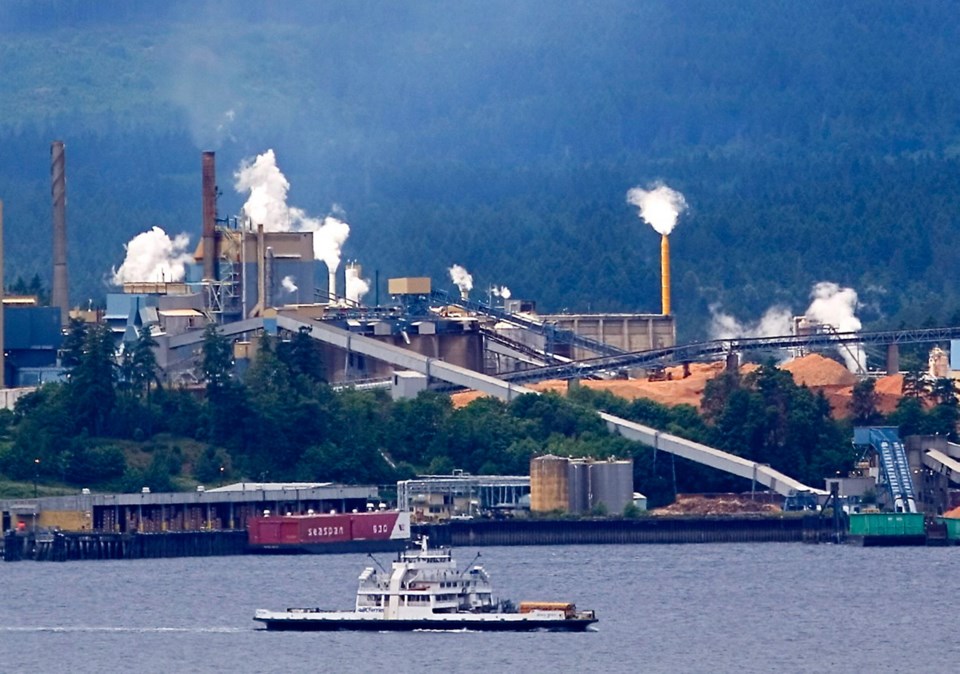 Premier John Horgan celebrated the sale of Catalyst Paper this week at the Crofton mill, but the government quietly retreated from a stand it took last summer to protect pensioners, in order to see the deal concluded.
Premier John Horgan celebrated the sale of Catalyst Paper this week at the Crofton mill, but the government quietly retreated from a stand it took last summer to protect pensioners, in order to see the deal concluded.
Four days before Monday’s Crofton celebration, a cabinet order was signed that exempts the transaction from a requirement the government imposed eight months ago.
When Catalyst was facing difficult U.S. tariffs last year, Horgan announced on July 27 that the government was stepping in to protect past and present employees.
“Our job is to make sure the interests of workers and retirees are protected,” he said then. “Should threatened tariffs force Catalyst Paper to take desperate actions to protect its own interests, our government’s action will protect retirees and workers.”
The company was selling U.S. assets at the time, and the fear was it would break up B.C. operations and sell them piecemeal. It has three mills on the coast, along with a Richmond headquarters and a Surrey distribution plant that employ a total of 1,500 people.
In response, the government drafted a quick amendment to the pension regulations specific to the company. It required that if any or all of the three coastal mills at Crofton, Port Alberni and Powell River were sold or closed, the company would have to fund its outstanding pension obligations “immediately.”
The tariffs were overturned later by U.S. authorities. In October, the sale of Catalyst Paper to another firm, Paper Excellence, was announced. The price was not disclosed. Catalyst had about $300 million in debt at the time.
Horgan welcomed the deal, calling it a vote of confidence in B.C.
“Keeping these operations open and jobs in place shows what B.C. can achieve when we come together and put workers, families and communities first,” he said at the time.
The deal, which under a corporate plan of arrangement required court approval, closed recently. That prompted the event outside the Crofton mill. Horgan expressed gratitude to Paper Excellence for stepping up.
But the pension shortfall remains outstanding, because the deal was exempted from the July regulation.
Pensioners had already reluctantly agreed to sustain reduction in their benefits in 2012, when the company went into creditor protection. About 950 pensioners voted to surrender some health benefits.
Court-supervised negotiations brought about that concession. The government gave the company more time to pay off its significant pension-funding shortfall. The time frame was extended from five years to 16 years.
The company’s pension plan has been underfunded for years. It had a $116-million deficit in 2012, but it has been reduced to $42 million as of 2017 and is estimated at $35 million.
Gary McCaig, an active member of a pensioner association, said he’s disappointed at the government’s decision not to enforce its own regulation.
“It particularly bothers us that, once again, pensioners are being asked to make a financial contribution to assure stability.”
“We really kind of resent this implication that it is the demands of the pensioners that are causing the company’s financial problems, when it’s anything but. Our plan has been underfunded for 17 years.”
The premier’s office said Tuesday that Paper Excellence has unconditionally guaranteed the pensions. Catalyst will continue to make pension payments, and Paper Excellence has guaranteed it will step in if Catalyst is unable, said the statement.
McCaig said that would represent a better outcome than might have been. It’s dependent on the parent company remaining solvent, but that’s a stronger likelihood than Catalyst surviving on its own, he said.
Paper Excellence is Richmond-based and Indonesian-owned, with other operations in B.C.
Tuesday’s statements were the first words pensioners heard about the state of the plan since last summer. McCaig said many requests made by lawyers, his association and individuals for information over the months were unsuccessful.
The company and its mills had an up-and-down recent history. It fought a legal battle over property taxes 10 years ago and lost. Then it fought its way out of creditor protection and now is under new ownership.
It’s also about to enjoy a big break. The company is B.C. Hydro’s largest single customer and will save several million dollars a year when the provincial sales tax is removed from electricity next month.



